From April 19th, the commemorative edition of "Cai Wenji" of Beijing Academy of Arts and Crafts will appear on the stage of the Capital Theater. As a commemorative repertoire for the 70th anniversary of the founding of the academy, the new and old faces familiar to the audience in "Cai Wenji", Xu Fan, Pu Cunxin, Zou Jian, Yang Lixin, Liu Hui, etc., all returned, as "intergenerational" partners. It can be regarded as a rare "gathering" on the stage of Renyi, and it is also a review and tribute to the glorious history of the theater handed down from generation to generation. 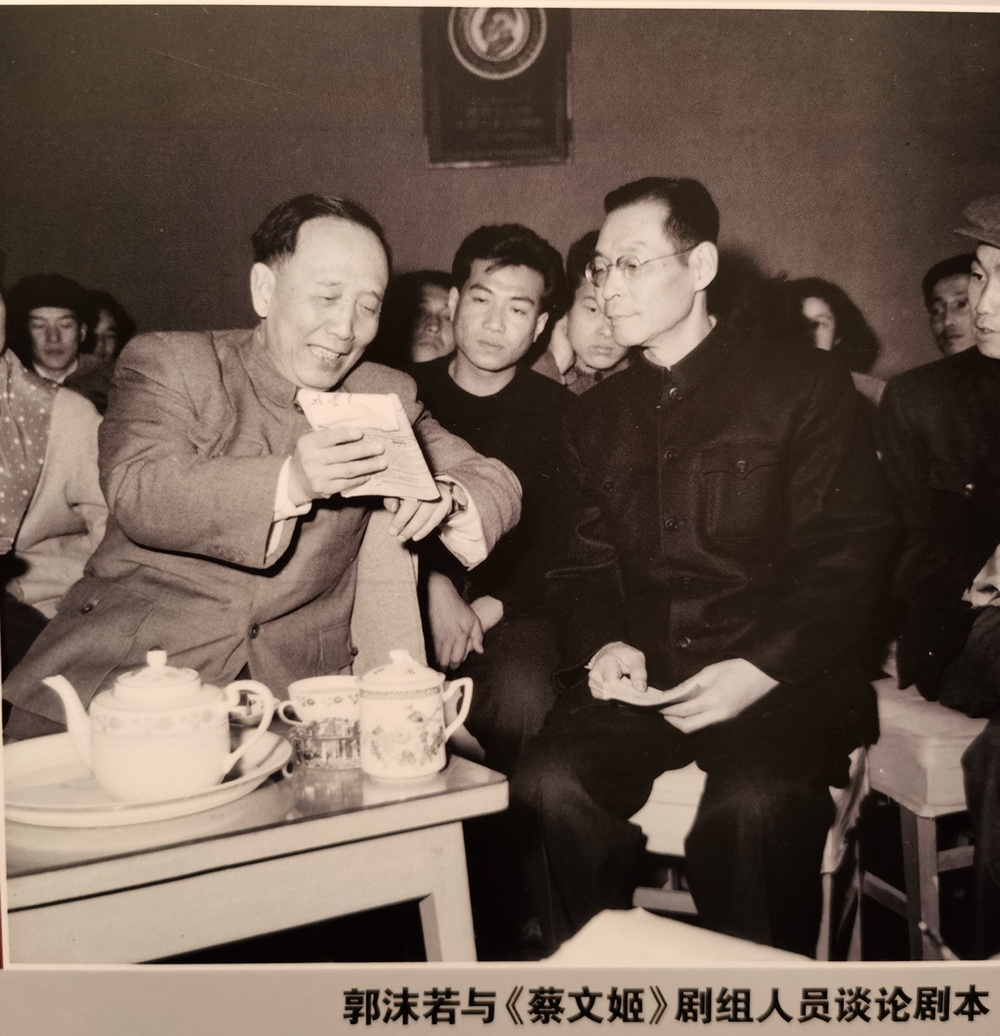
Looking back on the past, in 1959, the Beijing People's Art Theater staged a new historical drama "Cai Wenji". The play was written by Guo Moruo, directed by Jiao Juyin, and starred by artists such as Zhu Lin, Diao Guangtan, Lan Lanye, Su Min, and Tong Chao. The play integrates Guo Moruo's romantic creation feelings and Mr. Jiao Juyin's nationalized director's conception of dramas, creating a masterpiece of Chinese-style drama art. It can be said that it is not only a classic masterpiece in the history of Chinese drama, but also a benchmark work by Jiao Juyin, the chief director of Renyi, in the practice of drama nationalization.
The play "Cai Wenji" is based on the allusion "Wenji returns to the Han". The story sets the background in the Central Plains region where the wars were turbulent for years at the end of the Han Dynasty. Cai Wenji, the daughter of the great scholar Cai Yong, was fortunate to meet the Southern Huns Zuo Xian Wang to save her during the war. In the crisis, they formed a couple and went to a foreign country. Although she has children, Wen Ji misses her homeland. Twelve years later, Cao Cao, the prime minister of the Han Dynasty, wanted to bring him back from the Xiongnu to the Han Dynasty for the sake of Wen Zhisheng.
As soon as the play "Cai Wenji" came out, it won wide acclaim from industry experts. Dramatist Li Jianwu said: "The performance was a success." A Jia also wrote: "Comrade Jiao Juyin's directing work is very successful." After watching the performance, Guo Moruo immediately thanked Mr. Jiao Juyin: "You are with me On the basis of the materials used to build the thatched house, an art palace is built."
The design of the stage scheduling, the control of the rhythm of the drama and the creation of the stage atmosphere in the works are all endowed by the director's creation with a poetic and picturesque aesthetic style. The aesthetic needs of the audience. In 2001, director Su Min put the play on the stage again, and Xu Fan, Liang Guanhua, Pu Cunxin, Yang Lixin, Zhang Zhizhong and others joined. In 2011, Su Min and Tang Ye co-directed, Yu Mingjia, Pu Cunxin, Yan Wei, Zou Jian, Liu Hui and other actors formed a new lineup. For more than 60 years, the inheritance from generation to generation has made the history of "Wenji Returning to Han" and the breathtaking "Eighteen Beats of Hu Jia" an indelible stage memory. In addition to the story, the nationalized aesthetic expression, poetic and romantic artistic style of the works have become its distinctive signs, providing a model for the exploration of the nationalization of dramas in the future.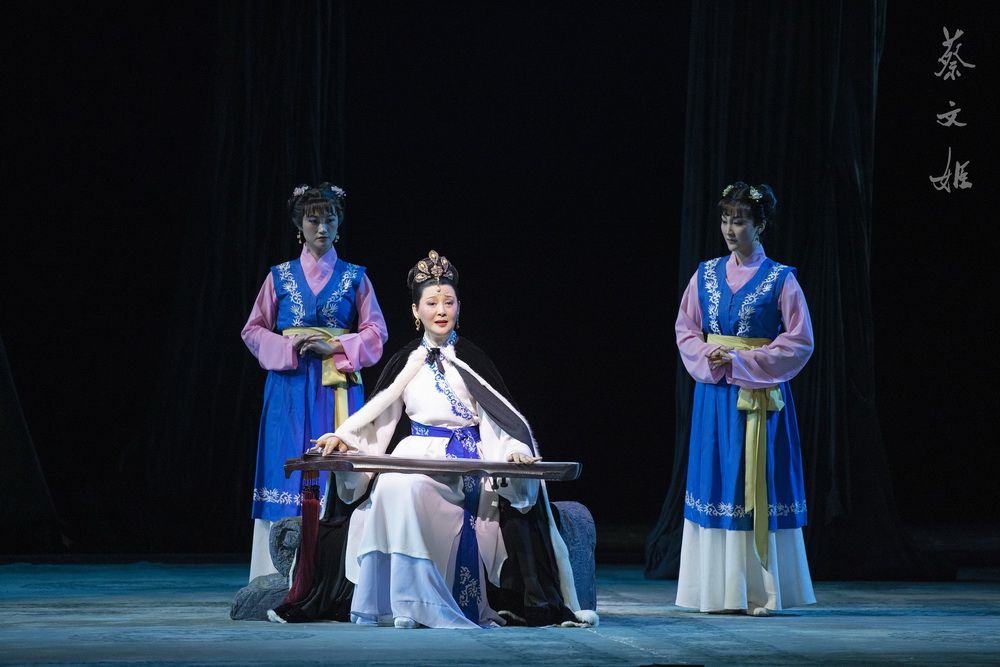
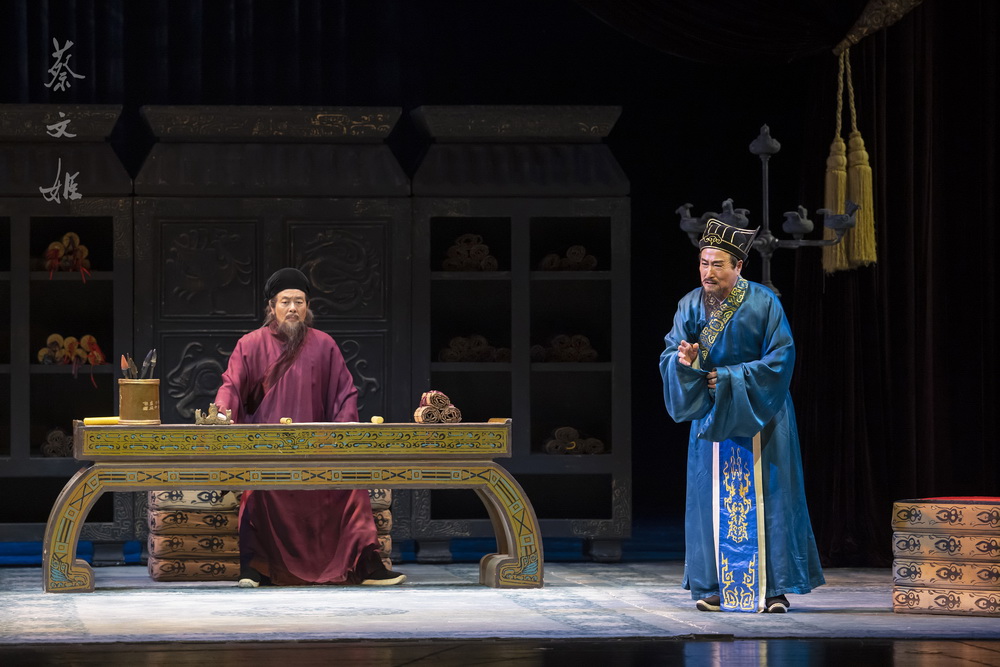
"To inherit the colorful chapters of the old generation of creators perfectly, avoid detours, and not stick to the so-called 'innovative' thinking of 'the methods others have used, modern people need to find a new way'." Director Tang Ye said that this year, for the sake of people The commemorative edition of "Cai Wenji", which was specially reunited for the 70th anniversary of the art, uses a lineup that combines old and new to "present the collective emotions of generations of creators to the audience through the precise interpretation of the stage characters, and jointly express a fresh, simple and shocking expression. Art style".
At the same time, inheritance does not mean that there is no creation, this time the performance is given a modern interpretation and interpretation. While allowing the audience to appreciate the traditional beauty, they can also have a dialogue with history with the understanding of contemporary people. "Let the audience believe it," Tang Ye said. In this play, the handling of love is more delicate, and the family and national conditions, husband and wife, mother and child are euphemistically moving; the interpretation of the characters is also fuller, the positive characters are more layered, and the "negative" characters are more reasonable.
As Guo Moruo, the screenwriter of "Cai Wenji", said that overturning the case for Cao Cao was his main purpose in writing this historical drama. The play "Cai Wenji" is directly related to the trend of overturning the case for Cao Cao that was once set off in my country's academic circles. In 1959, Guo Moruo said in the article "On Cai Wenji's Eighteen Shots of Hu Jia": "Cao Cao's contribution to the nation should be highly appraised. He should be called a national hero." In the play "Cai Wenji".
In the new version of "Cai Wenji", Pu Cunxin will continue to play the role of Cao Cao, who helped Wenji to return to Han so that she can continue to repair Han books. At the press conference before this round of performances, he told the surging journalists that he took over the role of Cao Cao for the first time in 2011. He told me that speaking drama performances should be life-like and should emphasize the sense of reality. Cao Cao should pause when reciting "Eighteen Beats of Hu Jia", but it should not be a rhythmic recitation. Because this is the first time Cao Cao has seen it. This piece needs to show a little strangeness and surprise, so as to win the trust of the audience.”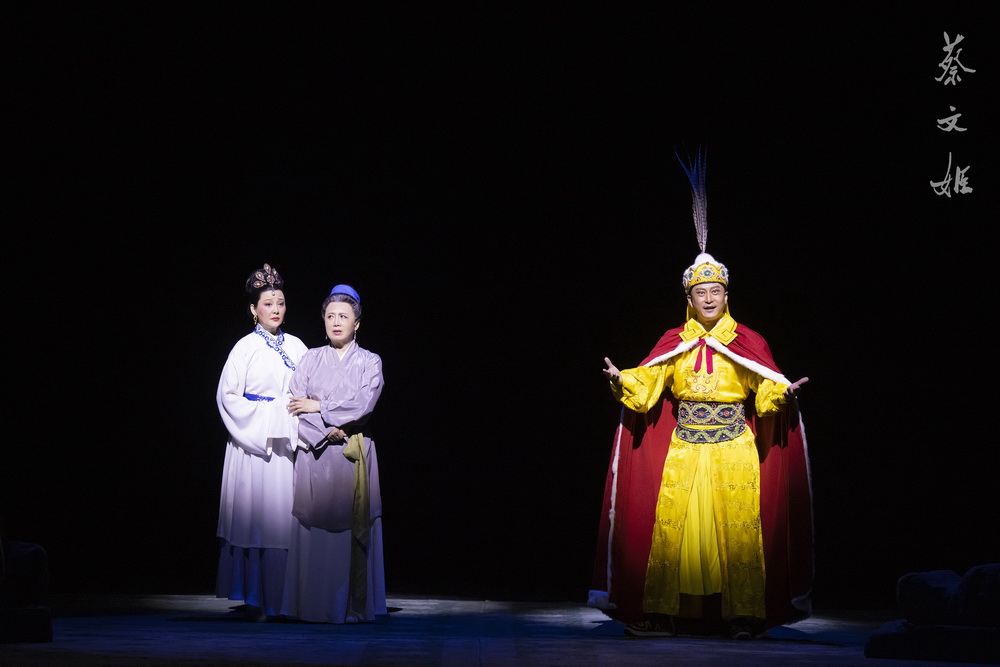
The aesthetic value of "Cai Wenji" is unquestionable. The procedures such as the tyrants, appearances, and steps in traditional operas, as well as the dragon art of group scheduling, have been refined and transformed and creatively applied to the performance art of the play. When appreciating this work, the audience can feel it from multiple dimensions, the most worth mentioning of which is the performance of the actors - the aesthetic form of Chinese opera and the romantic feelings of the play itself are all reflected in the performance of the actors, one step, When you turn around, you can see the reference and integration of opera. A line, a pause, can let the audience understand the exact meaning of the language in the rhythm, which is where "Cai Wenji" compares the actor's skill.
From playing the role of Cai Wenji in 2001 and 2007, to this year, actor Xu Fan met this role again after a lapse of 15 years. She believes that this drama has cultivated herself, "This drama can exercise the actor's temperament, mind and attitude. I am very I am fortunate to have met this role. I can even say that without Cai Wenji, Xu Fan would have no temperament."
As for playing such a talented female character again, Xu Fan said frankly that his current performance will be more mature, "Because my experience has grown, I can better understand the role. I think people should devote love to the country and family, so that life is meaningful.”
"Because of the two brothers Yang Lixin and Pu Cunxin, my heart is relaxed," Xu Fan said. In addition to the tacit understanding between the actors, the reunion of several old partners on the same stage also made the audience call it a long time ago. In 2001, Pu Cunxin was Dong Si in the play, and in 2011, he was "upgraded" to Cao Cao. Playing the role of Cao Cao again this time, this character has changed from the domineering impression in the audience's impression, but is more refined and wise, highlighting his side of Wenzhi and martial arts. Although he has never left the crew, Pu Cunxin believes that "how to find a balance between reality and romance is our eternal homework, and we must ponder every scene."
The so-called "negative character" Zhou Jin in the play was "corrected" by Yang Lixin this time. He is no longer a bad guy, but a "good guy who did something wrong". "This play is the ultimate work of romanticism. The way of life is not necessarily suitable. You must dare to use the performance on the stage to create rhythm, create suspense, create fun, and enrich the details yourself." Yang Lixin said. He told the surging news reporter that "Cai Wenji" can actually be regarded as a "poetry drama" in terms of the genre of opera, "The story of this drama is not complicated. Then the singing is over, because the audience is here to 'listen' to the play. But our drama actors want to 'speak' it and perform it, and we especially test the skill of the lines and the cooperation with each other."
There are seniors, there are juniors, and in the fusion of the old and the new, the older generation of actors said, "We were led by old artists before, and now we are going to lead young people." The younger generation sees more from the seniors how to realize their inheritance. Liu Hui, who played King Zuo Xian, played a soldier without lines when he was on the same stage with Xu Fan in 2007. He began to take over the role of King Zuo Xian in 2011. Now, he said that his biggest gain is "seeing how the seniors have gone from zero to zero." Begin the process of creating a character, knowing how they come, and knowing how to go." Dong Si, who also plays opposite Cai Wenji, is played by Zou Jian, who played Zhou Jin in the previous edition, "Old Guo's language is textbook-level, which tests the actor's literary accomplishment, professional ability and experience. long-term."
Beijing Renyi was once affectionately known as the "Guo Lao Cao" theater. On the occasion of the 70th anniversary of the founding of the academy, Beijing Renyi used this classic of Guo Moruo to taste the mellow taste of the nationalization of the drama with the audience on the stage of poetry. This round of performances will continue until May 3.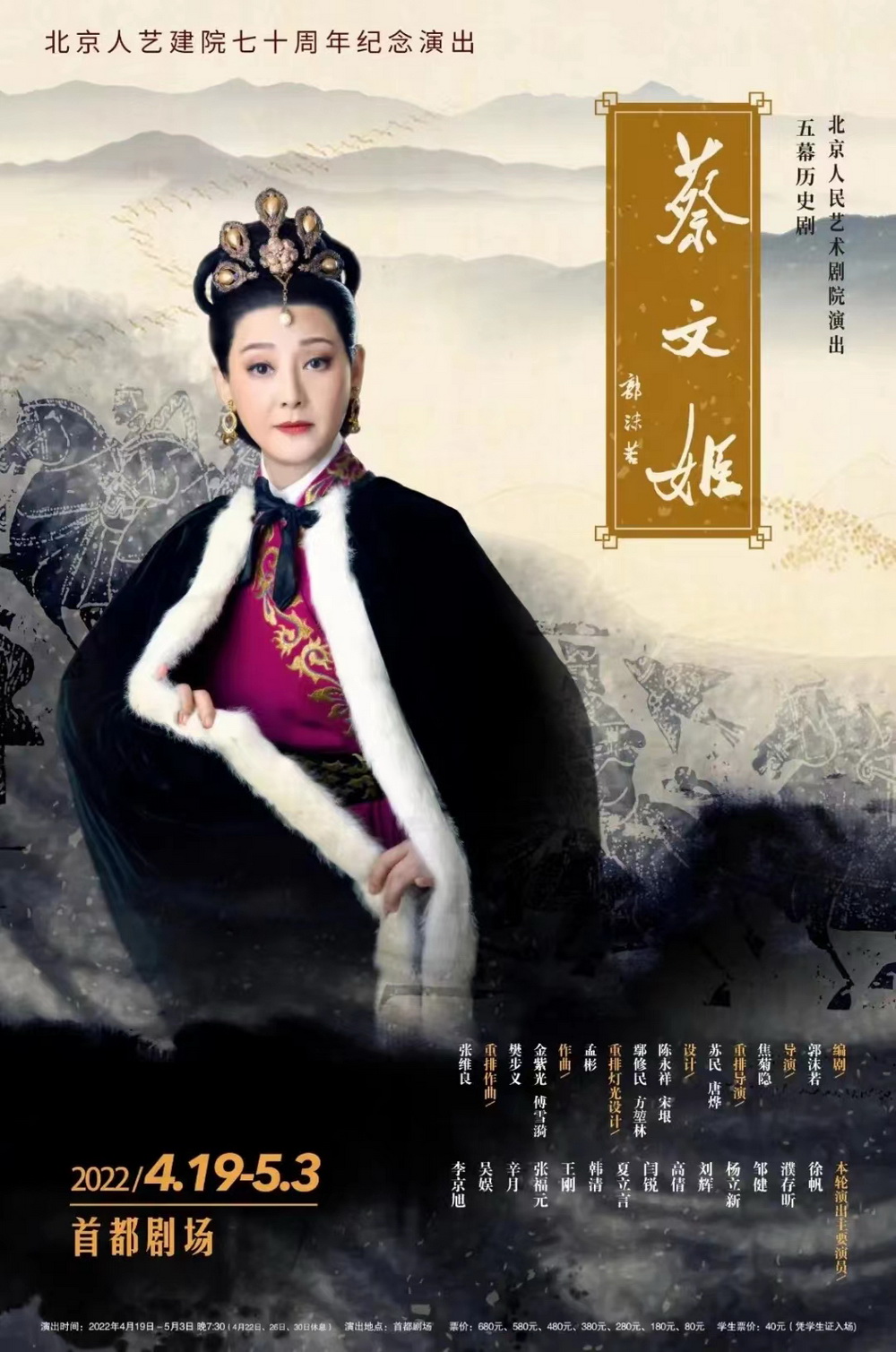

Screenwriter Guo Moruo (front left) talks about the script with the crew of "Cai Wenji", next to him is the director Jiao Juyin (front right)
A fine work of drama art with Chinese styleLooking back on the past, in 1959, the Beijing People's Art Theater staged a new historical drama "Cai Wenji". The play was written by Guo Moruo, directed by Jiao Juyin, and starred by artists such as Zhu Lin, Diao Guangtan, Lan Lanye, Su Min, and Tong Chao. The play integrates Guo Moruo's romantic creation feelings and Mr. Jiao Juyin's nationalized director's conception of dramas, creating a masterpiece of Chinese-style drama art. It can be said that it is not only a classic masterpiece in the history of Chinese drama, but also a benchmark work by Jiao Juyin, the chief director of Renyi, in the practice of drama nationalization.
The play "Cai Wenji" is based on the allusion "Wenji returns to the Han". The story sets the background in the Central Plains region where the wars were turbulent for years at the end of the Han Dynasty. Cai Wenji, the daughter of the great scholar Cai Yong, was fortunate to meet the Southern Huns Zuo Xian Wang to save her during the war. In the crisis, they formed a couple and went to a foreign country. Although she has children, Wen Ji misses her homeland. Twelve years later, Cao Cao, the prime minister of the Han Dynasty, wanted to bring him back from the Xiongnu to the Han Dynasty for the sake of Wen Zhisheng.
As soon as the play "Cai Wenji" came out, it won wide acclaim from industry experts. Dramatist Li Jianwu said: "The performance was a success." A Jia also wrote: "Comrade Jiao Juyin's directing work is very successful." After watching the performance, Guo Moruo immediately thanked Mr. Jiao Juyin: "You are with me On the basis of the materials used to build the thatched house, an art palace is built."
The design of the stage scheduling, the control of the rhythm of the drama and the creation of the stage atmosphere in the works are all endowed by the director's creation with a poetic and picturesque aesthetic style. The aesthetic needs of the audience. In 2001, director Su Min put the play on the stage again, and Xu Fan, Liang Guanhua, Pu Cunxin, Yang Lixin, Zhang Zhizhong and others joined. In 2011, Su Min and Tang Ye co-directed, Yu Mingjia, Pu Cunxin, Yan Wei, Zou Jian, Liu Hui and other actors formed a new lineup. For more than 60 years, the inheritance from generation to generation has made the history of "Wenji Returning to Han" and the breathtaking "Eighteen Beats of Hu Jia" an indelible stage memory. In addition to the story, the nationalized aesthetic expression, poetic and romantic artistic style of the works have become its distinctive signs, providing a model for the exploration of the nationalization of dramas in the future.

Xu Fan as Cai Wenji (middle)

Pu Cunxin plays Cao Cao (left), Yang Lixin plays Zhou Jin (right) Photo by Li Chunguang
Inherit the classics and give the works a modern interpretation, "emphasize the sense of authenticity""To inherit the colorful chapters of the old generation of creators perfectly, avoid detours, and not stick to the so-called 'innovative' thinking of 'the methods others have used, modern people need to find a new way'." Director Tang Ye said that this year, for the sake of people The commemorative edition of "Cai Wenji", which was specially reunited for the 70th anniversary of the art, uses a lineup that combines old and new to "present the collective emotions of generations of creators to the audience through the precise interpretation of the stage characters, and jointly express a fresh, simple and shocking expression. Art style".
At the same time, inheritance does not mean that there is no creation, this time the performance is given a modern interpretation and interpretation. While allowing the audience to appreciate the traditional beauty, they can also have a dialogue with history with the understanding of contemporary people. "Let the audience believe it," Tang Ye said. In this play, the handling of love is more delicate, and the family and national conditions, husband and wife, mother and child are euphemistically moving; the interpretation of the characters is also fuller, the positive characters are more layered, and the "negative" characters are more reasonable.
As Guo Moruo, the screenwriter of "Cai Wenji", said that overturning the case for Cao Cao was his main purpose in writing this historical drama. The play "Cai Wenji" is directly related to the trend of overturning the case for Cao Cao that was once set off in my country's academic circles. In 1959, Guo Moruo said in the article "On Cai Wenji's Eighteen Shots of Hu Jia": "Cao Cao's contribution to the nation should be highly appraised. He should be called a national hero." In the play "Cai Wenji".
In the new version of "Cai Wenji", Pu Cunxin will continue to play the role of Cao Cao, who helped Wenji to return to Han so that she can continue to repair Han books. At the press conference before this round of performances, he told the surging journalists that he took over the role of Cao Cao for the first time in 2011. He told me that speaking drama performances should be life-like and should emphasize the sense of reality. Cao Cao should pause when reciting "Eighteen Beats of Hu Jia", but it should not be a rhythmic recitation. Because this is the first time Cao Cao has seen it. This piece needs to show a little strangeness and surprise, so as to win the trust of the audience.”

Liu Hui (right) as King Zuo Xian
"Finding a balance between authenticity and romance"The aesthetic value of "Cai Wenji" is unquestionable. The procedures such as the tyrants, appearances, and steps in traditional operas, as well as the dragon art of group scheduling, have been refined and transformed and creatively applied to the performance art of the play. When appreciating this work, the audience can feel it from multiple dimensions, the most worth mentioning of which is the performance of the actors - the aesthetic form of Chinese opera and the romantic feelings of the play itself are all reflected in the performance of the actors, one step, When you turn around, you can see the reference and integration of opera. A line, a pause, can let the audience understand the exact meaning of the language in the rhythm, which is where "Cai Wenji" compares the actor's skill.
From playing the role of Cai Wenji in 2001 and 2007, to this year, actor Xu Fan met this role again after a lapse of 15 years. She believes that this drama has cultivated herself, "This drama can exercise the actor's temperament, mind and attitude. I am very I am fortunate to have met this role. I can even say that without Cai Wenji, Xu Fan would have no temperament."
As for playing such a talented female character again, Xu Fan said frankly that his current performance will be more mature, "Because my experience has grown, I can better understand the role. I think people should devote love to the country and family, so that life is meaningful.”
"Because of the two brothers Yang Lixin and Pu Cunxin, my heart is relaxed," Xu Fan said. In addition to the tacit understanding between the actors, the reunion of several old partners on the same stage also made the audience call it a long time ago. In 2001, Pu Cunxin was Dong Si in the play, and in 2011, he was "upgraded" to Cao Cao. Playing the role of Cao Cao again this time, this character has changed from the domineering impression in the audience's impression, but is more refined and wise, highlighting his side of Wenzhi and martial arts. Although he has never left the crew, Pu Cunxin believes that "how to find a balance between reality and romance is our eternal homework, and we must ponder every scene."
The so-called "negative character" Zhou Jin in the play was "corrected" by Yang Lixin this time. He is no longer a bad guy, but a "good guy who did something wrong". "This play is the ultimate work of romanticism. The way of life is not necessarily suitable. You must dare to use the performance on the stage to create rhythm, create suspense, create fun, and enrich the details yourself." Yang Lixin said. He told the surging news reporter that "Cai Wenji" can actually be regarded as a "poetry drama" in terms of the genre of opera, "The story of this drama is not complicated. Then the singing is over, because the audience is here to 'listen' to the play. But our drama actors want to 'speak' it and perform it, and we especially test the skill of the lines and the cooperation with each other."
There are seniors, there are juniors, and in the fusion of the old and the new, the older generation of actors said, "We were led by old artists before, and now we are going to lead young people." The younger generation sees more from the seniors how to realize their inheritance. Liu Hui, who played King Zuo Xian, played a soldier without lines when he was on the same stage with Xu Fan in 2007. He began to take over the role of King Zuo Xian in 2011. Now, he said that his biggest gain is "seeing how the seniors have gone from zero to zero." Begin the process of creating a character, knowing how they come, and knowing how to go." Dong Si, who also plays opposite Cai Wenji, is played by Zou Jian, who played Zhou Jin in the previous edition, "Old Guo's language is textbook-level, which tests the actor's literary accomplishment, professional ability and experience. long-term."
Beijing Renyi was once affectionately known as the "Guo Lao Cao" theater. On the occasion of the 70th anniversary of the founding of the academy, Beijing Renyi used this classic of Guo Moruo to taste the mellow taste of the nationalization of the drama with the audience on the stage of poetry. This round of performances will continue until May 3.











Comments